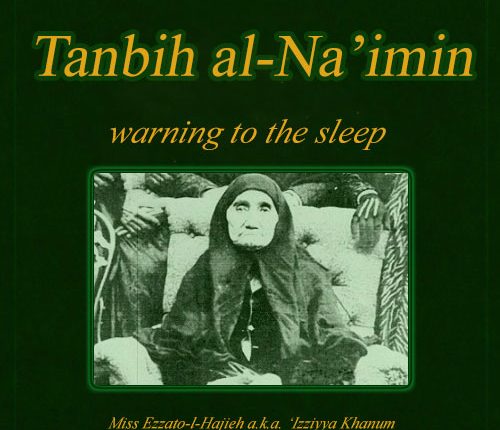Abstract
What is mentioned in this book is some of the approaches that two groups of Azalians and Baha’is used to show the incorrectness of each other’s beliefs about how to continue the teachings of Mirza Ali Muhammad Bab.
Baha’is were of the opinion that the time of action should be based on the teachings of the past and present Bahá’í teachings. Azalyan, emphasizing the teachings of the Bab, considered Baha’i teachings to be an obvious heresy.
The first part of this book is written by Abbas Effendi (Abdu’l-Bahá), who at the time of writing had just taken over the leadership of the Baha’is, and the second and third parts of the book are the words of Azalyan in response to the Baha’is’ claims.
After the claim of emergence by Mirza Hossein Ali Nouri (1863 AD), he took the side of Mirza Yahya Nouri nicknamed Sobhe Azal and remained a follower of Bayani religion. In response to the correspondence of her nephew Abbas Effendi, Izziyya Khanum prepared a Baha’i refutation, called Tanbihol -Naaemin.
In the following, we mention some of the reasons for this rejection.
Introduction
It is obviously clear that members of a family are more familiar with the events happening within the family. This introduction refers to the statements of Miss Ezzato-l-Hajieh a.k.a. ‘Izziyya Khanum (the grand sister of Mirzá Husayn-Ali Núri) in her book named Tanbih al-Na’imin (warning to the sleep).
In this book which is a reply to the statement issued by `Abbas Effendi (son of Bahá’u’lláh) she reveals some of the features of Bahá’u’lláh and the riot he guided. ‘Izziyya Khanum
After the claim of Man Yozherohullah by Mirza Hussein Ali Noori (1863 AD), she took side of Mirza Yahya Noori named Subh-i-Azal and remained the follower of Bayani Faith. ‘Izziyya Khanum in the response to her nephew’s (Abbas Effendi) correspondence decided to prepare the denial of the Baha’i Faith named Tanbih al-Na’imin .
In the following, we refer to some reasons of this rejections.
1- Educated prophet is rejected!
One of the most important features of all prophets is their illiteracy which is in part one of the proof of their prophecy. In this way Baha’ism also think that Mirzá Husayn-Ali Núri was illiterate.[1]
She extremely denies this and says that he began learning Arabic and literature in childhood and also continued in adolescence, and he was coming and going with mystics and philosophers.[2]
2-Who is the successor?
Another fact she says is that in spite of believing the Báb and his book (Bayán) in which Subh-i-Azal had been chosen as his successor, Bahá’u’lláh, because of high love to power, began to act against his brother (Subh-i-Azal) in order to defeat him and in this way what a massive slaughter he arranged. She says nearly about eighty people were murdered.[3]
Then he began to collect the whole document referring to Báb wills as to introduce Subh-i-Azal as his successor [4] and because of these huge crimes he involved, a lot of Bábi believers left it.
3-The policy of divide and rule!
She believes that Bahá’u’lláh had collected the whole versions of Bayán firstly in order to imitate it in his writings and deceive the people, secondly to destroy the whole verses of Bayán in order not to be within their reach and thirdly to destroy Báb’s order about Subh-i-Azal [5] and of course in this way he used the policy of dissension.
In fact he paid a great deal of respect to Subh-i-Azal, for instance he never sit without his brother’s permission or in another move he offered one of his daughters (`Abdu’l-Bahá’s sister) as a gift to Subh-i-Azal and insisted him to accept her as his servant but Subh-i-Azal refused.[6]
4-The letters
She then refers to a series of Báb’s letters about Subh-i-Azal and even a letter to Bahá’u’lláh [7] asking him to obey Subh-i-Azal and she comes to a conclusion with three probabilities about Bahá’u’lláh:
- Bahá’u’lláh had never believed in Báb and he wanted to see the consequence of Báb’s motion in order to benefit it.
- First he accepted Báb but later because of high mania of sovereignty he apostatized.
- He absolutely denied all prophets and their missions, refused God and considered the whole signs of God as fiction.[8]
Notes:
Browne, Edward G. and `Abdu’l-Bahá. A Traveler’s Narrative. Page: 87 and 116.
‘Izziyya Khanum. Tanbih al-Na’imin. Page: 4 – 5. To see the original page in Persian.
‘Izziyya Khanum. Tanbih al-Na’imin. Page: 6 – 7. To see the original page in Persian.
‘Izziyya Khanum. Tanbih al-Na’imin. Page: 16. To see the original page in Persian.
‘Izziyya Khanum. Tanbih al-Na’imin. Page: 17. To see the original page in Persian.
‘Izziyya Khanum. Tanbih al-Na’imin. Page 19 – 20. To see the original page in Persian.
‘Izziyya Khanum. Tanbih al-Na’imin. Page: 28 – 31. To see the original page in Persian.
‘Izziyya Khanum. Tanbih al-Na’imin. Page: 20 – 21. To see the original page in Persian.
| Title: Tanbih al-Na’imin |
| Year: 2015 (1394) |
| Pages: 420 |
| Author: Sayyid Miqdad Nabavi Razavi |
| Published By: Negahe Moasser |
| Location: Tehran |


Comments are closed.